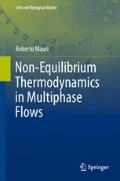Abstract
The time evolution of the probability density function of a set of random variables is described by the Fokker-Planck equation, named after Adriaan Fokker and Max Planck. Originally, it was developed to describe the motion of Brownian particles and later was generalized to follow the evolution of a set of random variables with linear phenomenological constitutive relations. In this chapter, the Fokker-Planck equation is derived in the framework of Markov processes (Sects. 4.1 and 4.2), showing its most general solution (Sect. 4.3) and how the fluctuation-dissipation theorem follows from it (Sect. 4.4). Then, in Sect. 4.5, a counter example is illustrated, where we show that when the applied forces are non-conservative the fluctuation-dissipation theorem cannot be applied. Finally, in Sect. 4.6, we study the simplest case of Brownian motion, namely pure diffusion, also referred to as the Wiener process, named in honor of Norbert Wiener, stressing how the associated mathematical inconsistencies can be completely resolved only by applying the theory of stochastic differential equations (see Chap. 5).
Access this chapter
Tax calculation will be finalised at checkout
Purchases are for personal use only
Notes
- 1.
This condition is not required for the validity of Eq. (4.1), but it is essential in the definition of a Markov process.
- 2.
- 3.
The FPE is also known as the Kolmogorov, or as the Smoluchowski equation, named after Andrey Nikolaevich Kolmogorov and Marian Ritter von Smolan Smoluchowski, respectively.
- 4.
Since the FD theorem simply cannot be applied in this case, the word “violation” has been put between quotation marks in the title of this section.
- 5.
Letting t→0 in (4.78) and considering the initial condition (4.75), we see that the Dirac delta is a distribution, corresponding to the limit of a series of normalized Gaussian functions as their variance tends to zero. In that limit, as expected, (4.78) shows that its Fourier transform is a constant.
- 6.
A formal proof of this statement can be found in [2, Sect. 4.2.5].
References
Chandrasekhar, S.: Rev. Mod. Phys. 15, 1 (1943)
Gardiner, C.W.: Handbook of Stochastic Methods. Springer, Berlin (1985)
Leporini, D., Mauri, R.: Fluctuations of non-conservative systems. J. Stat. Mech., P03002 (2007)
Mauri, R., Leporini, D.: Violation of the fluctuation-dissipation theorem in confined driven colloids. Europhys. Lett. 76, 1022–1028 (2006)
Uhlenbeck, G.E., Ornstein, L.S.: On the theory of the Brownian motion. Phys. Rev. 36, 823–841 (1930)
Wax, N.: Noise and Stochastic Processes. Dover, New York (1954)
Author information
Authors and Affiliations
Rights and permissions
Copyright information
© 2013 Springer Science+Business Media Dordrecht
About this chapter
Cite this chapter
Mauri, R. (2013). Fokker-Planck Equation. In: Non-Equilibrium Thermodynamics in Multiphase Flows. Soft and Biological Matter. Springer, Dordrecht. https://doi.org/10.1007/978-94-007-5461-4_4
Download citation
DOI: https://doi.org/10.1007/978-94-007-5461-4_4
Publisher Name: Springer, Dordrecht
Print ISBN: 978-94-007-5460-7
Online ISBN: 978-94-007-5461-4
eBook Packages: Physics and AstronomyPhysics and Astronomy (R0)

